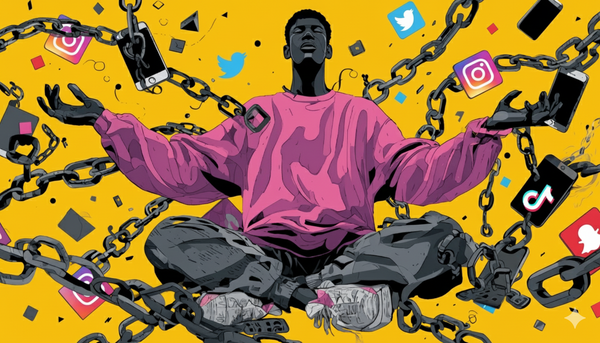Why your new year's resolutions almost always fail 🤷♀️


👆👆Podcast version of today's newsletter above! 👆👆
Happy 2025 you beautiful b*stards.
As is the tradition every year, I’ve no doubt you already have a list of new year’s resolutions locked and loaded in the shiny new achievement cannon you bought yourself for Christmas.
This year you’re going to be doing, achieving, unlocking, nailing, or whatever superlatives that you decide to choose to frame the.year.that.was.all.about.me.and.my.resolutions.that.I’m.definitely.this.time.for.sure.going.to.keep.
I know I certainly have.

But before you light the fuse on the resolutions cannon and fire it into the darkest, windiest, wettest months of the new year, know this: about 80% of people fail to keep up with their resolutions by February.
Of the fraction that survives the January onslaught? Only 8% stick around till next Christmas.
Well that’s a kick in the new year-new-me resolutions teeth, isn’t it? It is if you follow the tried method you’ve used in previous years.
But in this week’s Brink, I’ve got a different approach to new year’s resolutions.
Ready? Onwards!
A Brief History of New Year’s Resolutions 📜

You’re not the first, and you certainly won’t be the last person to try and turn over a new leaf when the calendar tells us it’s a new year.
It turns out this ritual is thousands of years old: the ancient Babylonians were the first to start doing it, some 4,000 years ago.
When they ushered in the New Year - which typically began in mid-March according to our Gregorian Calendars - they made promises to the gods that they were going to pay off debts and return stuff they no longer needed. Sound familiar?
The Romans loved a New Year’s resolution too. Julius Caesar, who mucked about with the calendar to make January 1 the start of a new year, joined his fellow Romans to offer sacrifices to the gods and make promises to behave themselves as the clock struck 12.

When Christianity rocked up on the continent, kicking out the polytheistic beliefs of previous generations, things became a bit more forlorn.
For early Christians who swapped many gods for one god, the first day of the new year was marked by reflecting on all the terrible things they had done the year before, and promising to be better next year.
In 1740, the English clergyman John Wesley, the founder of Methodism, decided that New Year’s resolutions had gotten a bit rambunctious. So he created the Covenant Renewal Service, where churchgoers renewed their faith in Christ on New Year’s Eve and New Year’s Day - and were allowed to make a few resolutions too.
While for most of us, our resolutions are largely secular - unless God really wants you only to drink green juice for an entire month - they are part of a spiritual and religious tradition that dates back thousands of years.
But if we’ve been doing this for 4,000 years, why are we so bloody bad at keeping them?
Why New Year’s Resolutions Fail 🤦

There is a long therapeutic reason and a short, easy-to-understand reason why Resolutions fail. The short one? Our resolutions are typically overly specific and difficult to achieve. Let’s take an example.
We have a tendency to say “I’m going to lose ten kilos this year” or “I’m going to read 100 books”. That’s oddly specific, isn’t it? When we create exacting goals, it means there is a thin line between success and failure. What happens if you only lose a stone, or only read 50 books? Is that a failure?
When we start to sputter along the road to these specific goals, it feels like those goals become impossible and as such, we let them go.

We also tend to make goals that require a significant amount of personal change to achieve them. So with the two examples above, if we compare them to our past performance - as in how we were in 2024 - we probably don’t have a history of exercising and dieting or making the time to read to allow those goals to be met. Instead, we set the bar incredibly high and when we don’t grab a hold of it, we let it go.
Or do we?
The longer version 🧐

There is something interesting going on here about why we choose to create goals that we are more than likely to not meet, and what that says about us. More on that later. But in this part, I want to talk about the longer reason why we find these changes so challenging.
Change is difficult. Not impossible, but difficult. As a result, there needs to be a broader shift in our perspective to give that part of ourselves every opportunity to become the version it really wants to be. Whether it’s slimmer, happier, healthier, more knowledgeable, you name it.
To do it, we need to bring to bear lots of different parts of us to help it along its way. So if it’s hitting the gym four times a week, we need to see it as a more holistic goal of “make space for myself to be able to exercise”.

With that broader idea, we can then see what other bits need to be factored in. Things like:
- Where and when can I feasibly exercise?
- Do I need to move/cancel/give up something to be able to do that?
- Is four times a week realistic?
- Can I set myself an initial set of smaller goals, like going once per week, and gradually increasing it with time?
- Do I need to think about what I’m eating a bit more?
- How’s my alcohol consumption doing?
- How’s work stress?
- Are there parts of my life actively working against this goal that I need to look at first?
That initial resolution is really far more involved than just getting your lazy arse to the gym. It’s a bigger question: can I make small changes to multiple parts of my life to make it an easier thing to achieve?
Think of a New Year’s Resolution as more of a headline. Something in lights that grabs attention. But that headline needs a story, and a narrative. We need to understand what are the stepping stones to get us to that headline. Anyone can make a declaration, but can we build the foundations to make that declaration feasible?
If that sounds too much like hard work, there’s a different approach.
Create a bigger target 🎯

Another approach is to change the way we make resolutions. I’ve spoken about specific goals here, but what about broader ones that set you in a direction you like to go in?
So instead of 100 books in one year, can it be “a year of reading” with some more precise details beneath it?
The idea is that if we can head in a direction we broadly like, it’s more likely to create a positive incentive to keep going and give it more time and energy.
This idea speaks to a new year’s resolution not being a singular act, but a movement in a specific direction. So if we read more, or moved more, that’s a win right? We set out to do something and we did that.

But Matt, if life was only this simple, we’d all be achieving all the time, but if 80% of the time we all fail, surely there’s something more complicated going on? Ah yes, I see you’ve been reading up on Freud during the Christmas break.
Spend any time in a therapy room, either as a client or therapist and you’ll see a pattern: we tend to repeat ourselves. Not in a speech impediment way, but in a broader emotional, relational kinda way.
We all have a habit of returning to old ideas or patterns of behaviour that logically, we can see might be problematic, but yet we end up right back in them. Freud called this the Repetition Compulsion, this idea that we unconsciously revisit or repeat traumatic circumstances for reasons that clients might be unaware of.

When Freud first started out, he worked on the assumption that humans and most other animals were pleasure seeking beings. We tended to gravitate towards things that made us feel good, and away from things that made us feel bad. But the more he worked, the more he saw the opposite was true: people frequently and often head towards the things that they knew made them feel bad, but felt almost powerless to stop.
This idea has long been pondered in the therapy world. Otto Fenichel, another prominent therapist from the 20th century took the idea further. He believed the repetition compulsion can create an unusual form of comfort or familiarity for people.
Repetitive Resolutions 🔄

Let’s go back to New Year’s Resolutions: if we fail at them every year, that can often be an integral part of the ritual itself: to not succeed because we know what that looks like. Fenichel believed it was a way of making more painful experiences from childhood become more attractive ones in adulthood.
For example (these are ideas, not proven facts BTW), a person who was spanked as a child may incorporate this into their adult sexual practices, or a victim of sexual abuse may attempt to seduce another person of authority in his or her life (such as their boss or therapist): an attempt at mastery of their feelings and experience, in the sense that they unconsciously want to go through the same situation but that it not result negatively as it did in the past.
So pulling it back to New Year’s Resolutions for a moment, failing at these can be a form of mastery over some bigger failure or rejection we experienced in the past. But this unique coping strategy does have its benefits.

Erik Erikson called it a “destiny neurosis”: it was a nuanced technique our brains devise as a way of learning to overcome something larger or more difficult. To fail gently, might be a way of dealing with the greater failures we endure in life.
Is this what drives the mass failure of New Year’s resolutions? Who knows. And perhaps more importantly, who cares? The ritual of making lists to improve ourselves can be little more than a thing we do at a certain time of year, like opening a Christmas cracker. Or it can be the springboard to a better version of you. That’s for you to decide.
Therapists have spent decades trying to work this all out, but the endless pontificating can sometimes make us feel there is a ‘right’ and ‘wrong’ way of thinking and feeling. There isn't. There’s just how you feel and whether you feel it works for you.
However you choose to spend 2025, spend it in a way that makes you feel happy. If that means you ignore that gym subscription and the pile of books you got for Christmas and the stack of boxes to organise the rats nest that are your drawers, go forth and prosper.
Happy New Year.
I love you all. 💋
Things we learned this week 🤓
- 🤷♂️ People prefer when you submit work on time rather than perfecting it through procrastination.
- 🧠 Being in a relationship changes your personality, says study.
- 🥦 Want to help children regulate their emotions? Don’t be so harsh when it comes to eating their greens.
- 🤔 Is there a silver bullet to improving female mental health? Maybe…
Just a list of proper mental health services I always recommend 💡
Here is a list of excellent mental health services that are vetted and regulated that I share with the therapists I teach:
- 👨👨👦👦 Peer Support Groups - good relationships are one of the quickest ways to improve wellbeing. Rethink Mental Illness has a database of peer support groups across the UK.
- 📝 Samaritans Directory - the Samaritans, so often overlooked for the work they do, has a directory of organisations that specialise in different forms of distress. From abuse to sexual identity, this is a great place to start if you’re looking for specific forms of help.
- 💓 Hubofhope - A brilliant resource. Simply put in your postcode and it lists all the mental health services in your local area.
I love you all. 💋












